Key takeaways:
- Therapy is a partnership aimed at self-exploration rather than simply providing solutions.
- Key benefits of therapy include emotional regulation, self-discovery, improved relationships, and coping skills.
- Finding the right therapist is crucial; chemistry and communication style significantly impact the therapeutic experience.
- Common misconceptions about therapy include viewing it as only for severe issues or expecting quick fixes; meaningful change takes time and introspection.
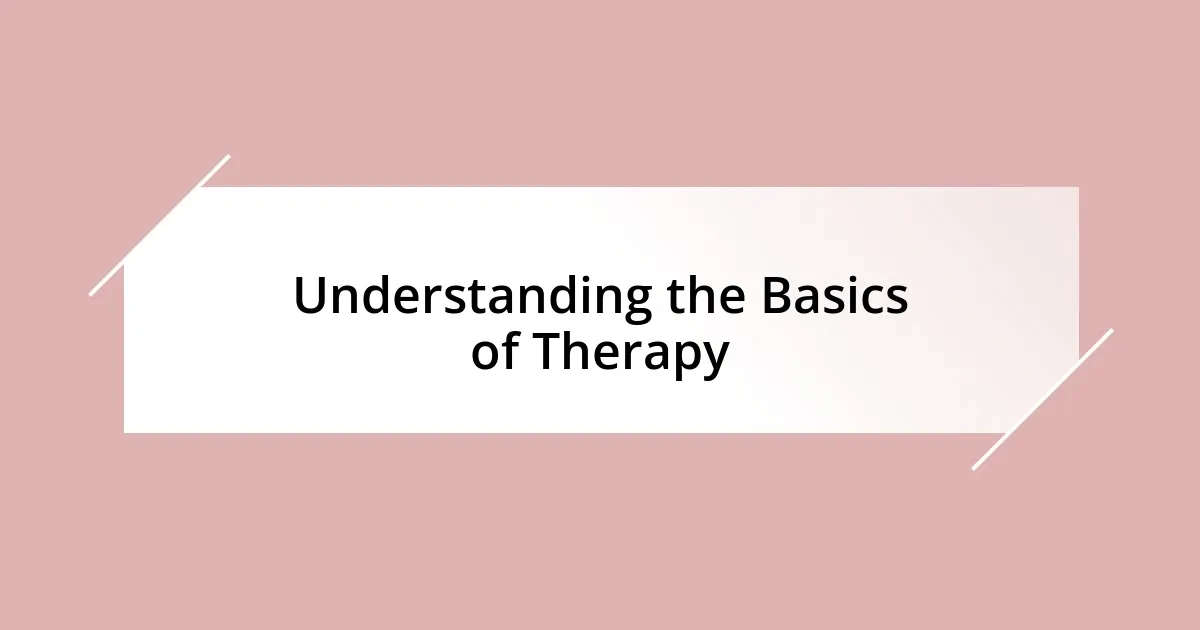
Understanding the Basics of Therapy
Therapy can seem daunting at first, but it’s really just a space for you to explore your thoughts and feelings. I remember my first session; I walked in feeling nervous yet hopeful, wondering, “What if I really could find clarity?” That anticipation turned into relief as I recognized the therapist’s job was simply to listen and guide me through my own mind, not judge or fix me.
When you think about therapy, picture it as a partnership between you and a trained professional. This dynamic creates a safe environment where you can express yourself freely. I recall a moment during my sessions when I voiced fears I had buried for years. By sharing, I felt a weight lift off my shoulders—perhaps that mutual understanding was the real therapy at work.
Understanding that therapy isn’t about someone telling you what to do can be liberating. I used to believe I needed all the answers before diving in, yet each session revealed so much more to me than I anticipated. Does it make you curious to think about what insights you might uncover too? It’s often those unexpected breakthroughs that spark the most significant changes in our lives.
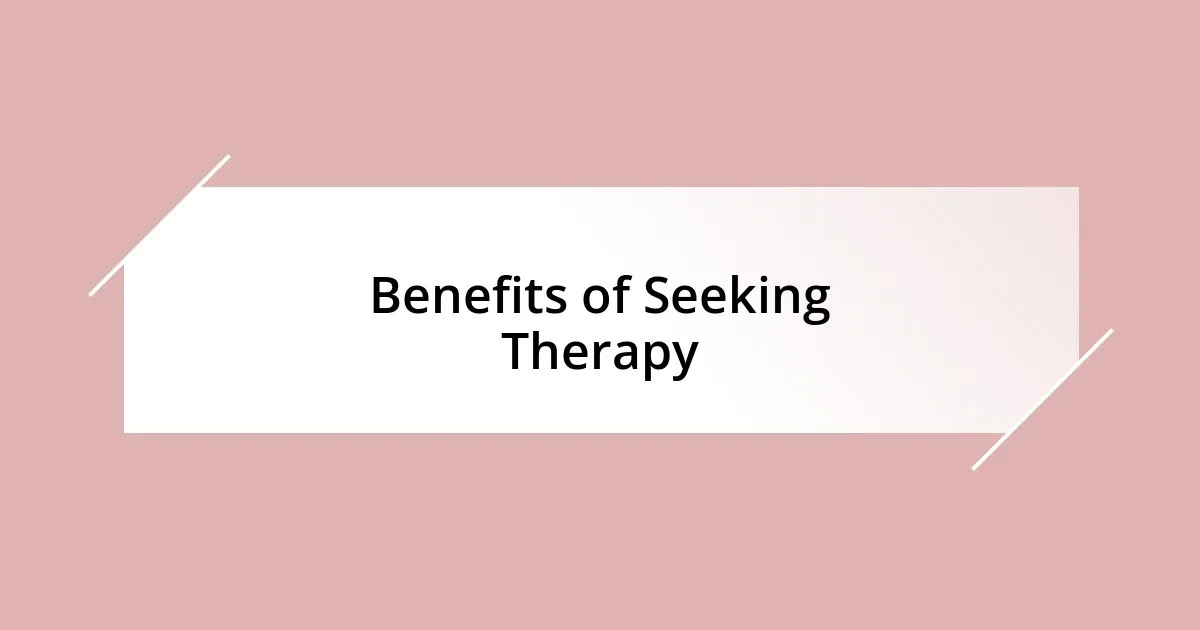
Benefits of Seeking Therapy
One of the most profound benefits of seeking therapy is the ability to clarify your thoughts and feelings. I remember struggling with a persistent feeling of doubt that clouded my decisions. After a few sessions, I started to untangle those emotions, gaining a clearer understanding of what was driving my insecurities. This clarity shifted my perspective and allowed me to approach life with more confidence.
Here are some key benefits I’ve discovered through therapy:
- Emotional Regulation: Therapy teaches you to navigate difficult feelings, helping you respond rather than react.
- Self-Discovery: It provides a space for deep self-reflection, allowing you to learn more about your values and desires.
- Improved Relationships: By understanding yourself better, you develop healthier interactions with others.
- Resource for Coping Skills: Therapy equips you with practical strategies to handle life’s challenges.
- Support Network: You gain an ally who genuinely cares about your well-being and growth, fostering a sense of belonging.
Seeking therapy has been a journey of continuous growth, reflecting both the challenges and triumphs in my life. Each session has been a stepping stone toward greater self-awareness, and I can’t emphasize enough how liberating that journey can be.
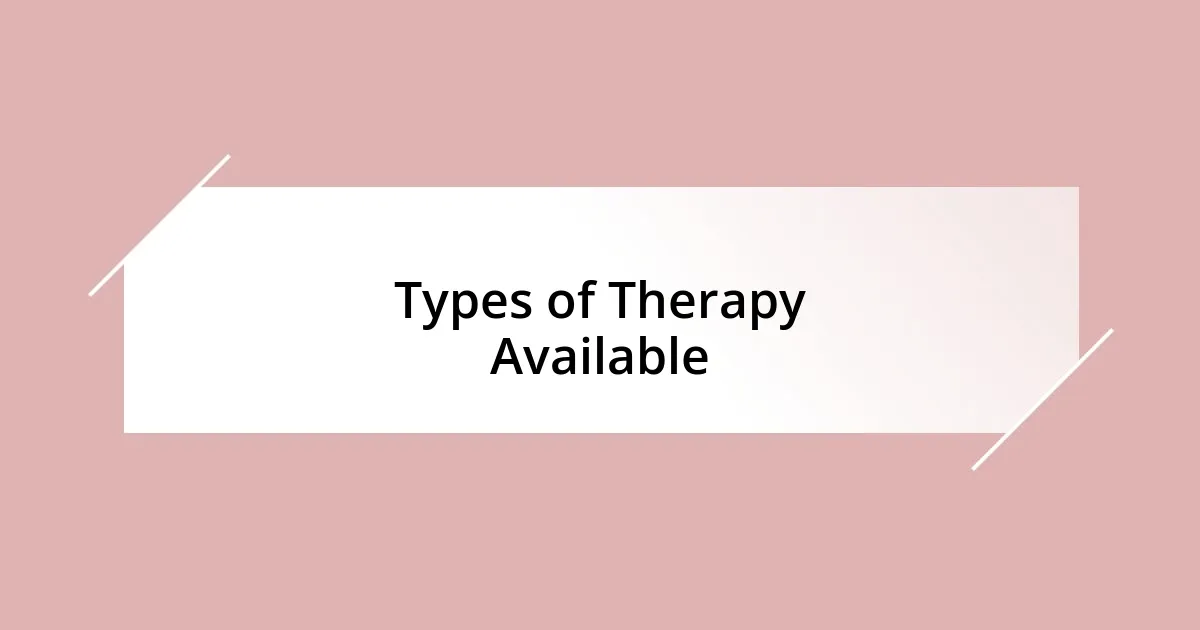
Types of Therapy Available
Therapy comes in many forms, each tailored to meet different needs and preferences. I’ve tried various types, and one that stands out for its conversational nature is Cognitive Behavioral Therapy (CBT). In my experience, CBT focuses on identifying and changing negative thought patterns. It’s effective for anxiety and depression, helping you see situations from a new perspective. I remember one session where I realized the power my thoughts had over my feelings. It was like flipping a light switch—I could finally see how altering my thoughts changed my mood.
Another popular approach is Psychodynamic Therapy, which dives into the subconscious. I found it fascinating how exploring childhood experiences could shed light on adult behaviors. In one session, I connected a childhood event to my struggle in relationships. That moment felt pivotal, as understanding the root of my issues brought immense relief. Reflecting on the past can be challenging, but sometimes it’s necessary for growth.
Let’s not forget Humanistic Therapy, which emphasizes personal growth and self-actualization. I once spoke to a therapist about my goals and dreams during a session, and through that discussion, I felt empowered to pursue passions I’d shelved. The focus on the here and now made the journey towards self-identity feel less daunting. Each therapy style has its unique flavor, and it’s about finding what resonates with you.
| Type of Therapy | Description |
|---|---|
| Cognitive Behavioral Therapy (CBT) | Focuses on changing negative thought patterns to improve emotional responses. |
| Psychodynamic Therapy | Explores unconscious processes and childhood experiences to understand emotional pain. |
| Humanistic Therapy | Encourages self-exploration and personal growth, emphasizing the importance of the present. |
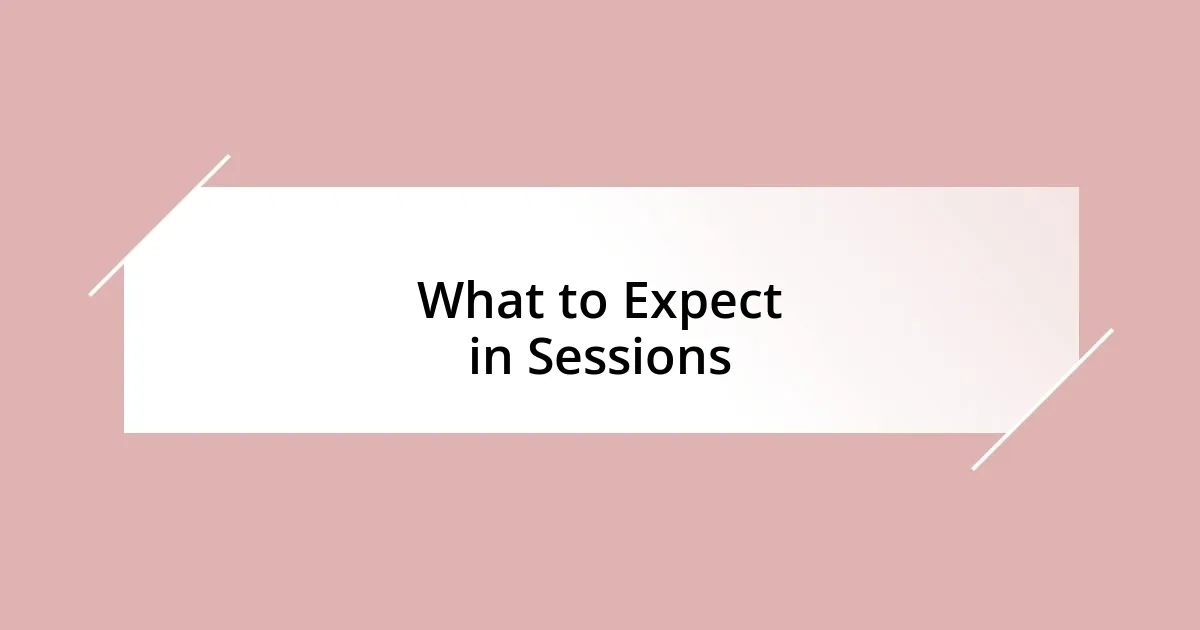
What to Expect in Sessions
In therapy sessions, the atmosphere is often warm and inviting, creating a safe space for you to unpack your thoughts. I vividly recall stepping into my first session, feeling a mix of anxiety and anticipation. It surprised me how my therapist encouraged me to share whatever was on my mind, free of judgment. This open dialogue allowed for real connections and insights—something I hadn’t realized was possible.
You might wonder how a typical session unfolds. Often, it begins with a check-in about your week, allowing you to reflect on any significant events or feelings. I remember one session where I hesitated to discuss a particularly tough day. But once I opened up, it felt like a weight was lifted. The conversation flowed into exploring what triggered those feelings, leading me to revelations about my emotional triggers and coping mechanisms.
As you dive deeper into therapy, expect to tackle both the comfortable and uncomfortable moments. I once found myself grappling with a memory I had buried for years. While it felt daunting to confront that past, it was within that discomfort that I unearthed a deeper understanding of my patterns. Each session is not just about expressing feelings but also about challenging yourself—an integral part of the healing journey.
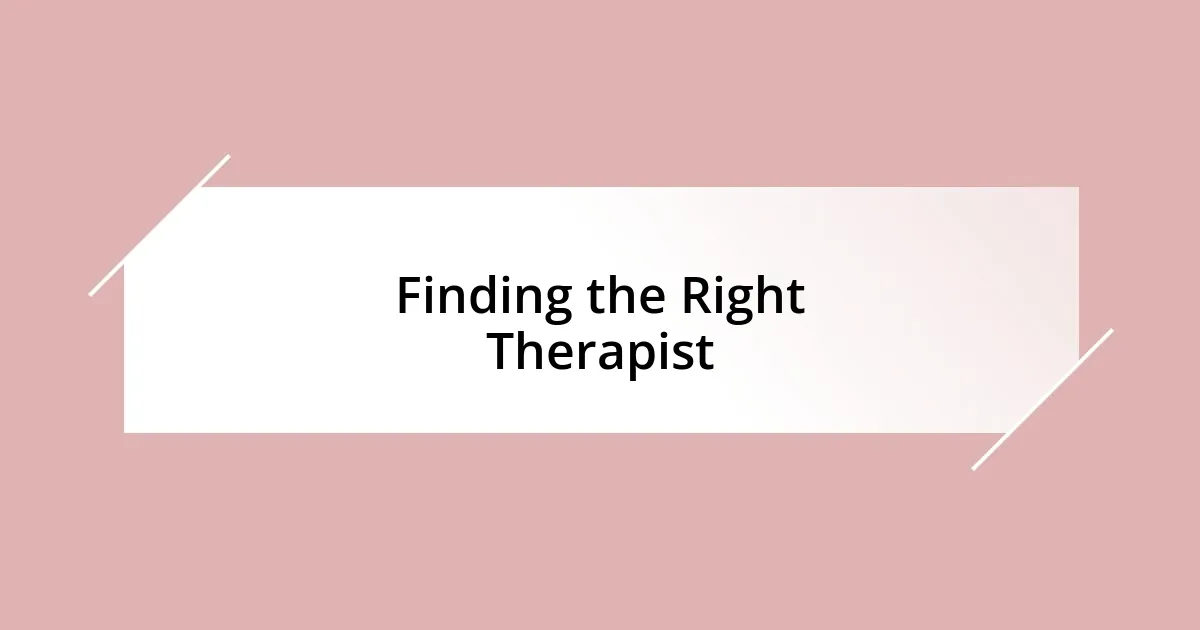
Finding the Right Therapist
Finding the right therapist can feel like searching for a needle in a haystack. When I first began my journey, I didn’t realize how crucial this step was. Think about it: if therapy is a partnership, wouldn’t you want someone who truly gets you? After meeting a few therapists, I found that chemistry matters just as much as qualifications. One therapist I clicked with had an uncanny ability to understand my perspective, which made me feel comfortable sharing my vulnerabilities.
As you look for a therapist, consider their communication style and approach. I remember one interview where the therapist’s warm and approachable demeanor instantly put me at ease. It was a stark contrast to another where I felt rushed and disconnected. This brought to mind an important question: How do you want to feel during your sessions? For me, feeling supported was non-negotiable, and I learned that being upfront about my needs helped me find someone who aligned with my expectations.
Don’t hesitate to advocate for yourself during the search. I once made a list of qualities that mattered most to me—like compassion and experience with anxiety. This exercise not only clarified what I sought but also made me more confident when interviewing potential therapists. If something doesn’t feel right, trust your gut; your instincts can guide you toward a therapist who helps you on your path to healing.
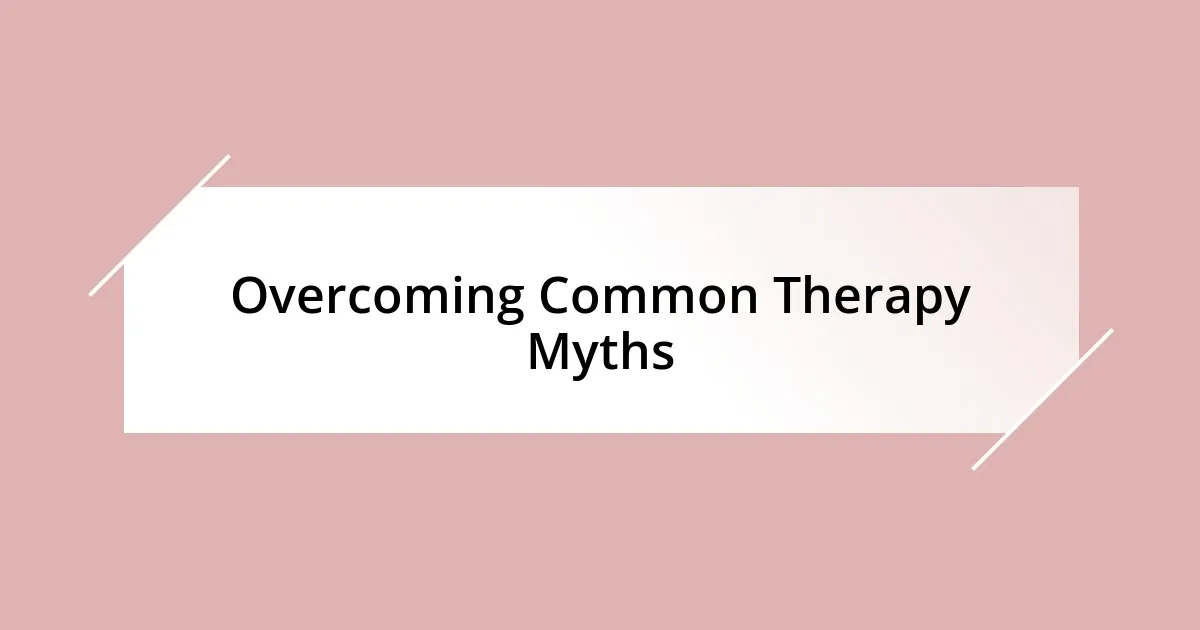
Overcoming Common Therapy Myths
It’s common to hear that therapy is only for those with severe problems. When I first considered going, I thought, “Isn’t it just for people with real issues?” But I quickly learned that therapy can benefit anyone, regardless of their situation. Whether you’re dealing with everyday stress, relationship challenges, or just need someone to listen, therapy offers invaluable support.
Perhaps one of the biggest misconceptions is that therapy is a quick fix. I used to believe that a few sessions would suddenly align all my thoughts and feelings. In reality, I discovered that meaningful change takes time, reflection, and sometimes revisiting tough subjects. I remember feeling frustrated during particularly slow periods, but those were the moments that led to the most profound breakthroughs for me.
Moreover, people often think therapists will simply tell you what to do. I used to envision a therapist as an authoritative figure guiding me with direct advice. Instead, I found my therapist encouraged me to find my own answers by exploring my feelings and thoughts. It felt empowering, like I was in the driver’s seat of my own healing journey, instead of being told where to go. Isn’t it fascinating how much more meaningful it is to carve your own path?
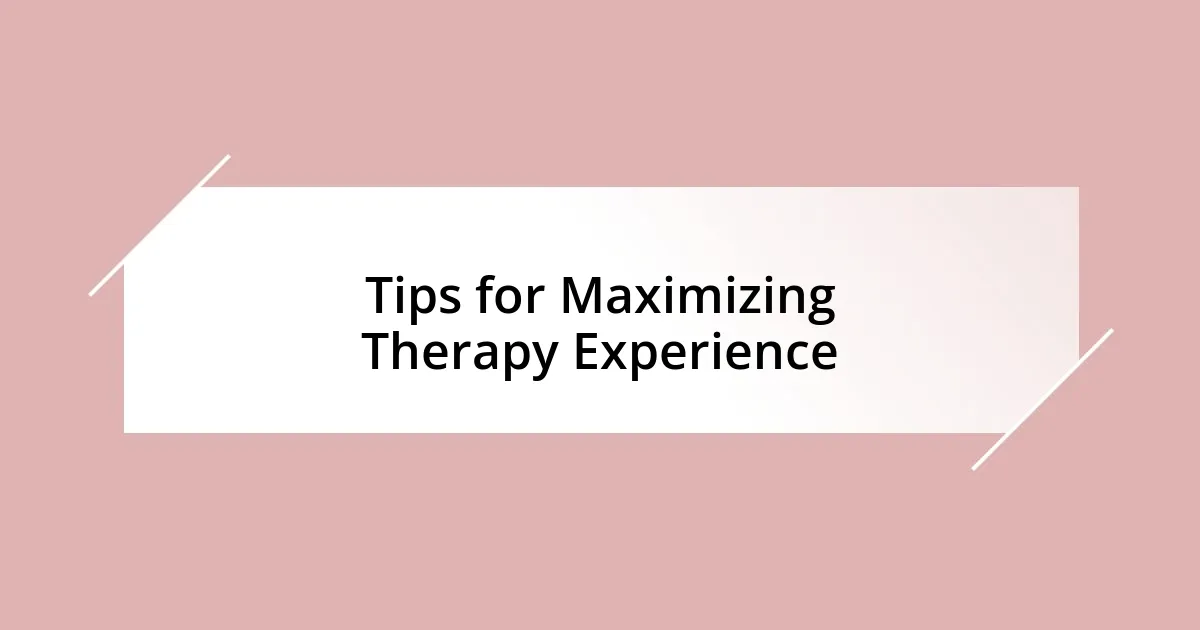
Tips for Maximizing Therapy Experience
Maximizing your therapy experience truly hinges on your willingness to be open and honest. I remember walking into my first session feeling anxious but quickly realized that sharing my true thoughts, no matter how uncomfortable, made a world of difference. It’s like peeling an onion—each layer reveals something deeper, but you have to be brave enough to start.
Setting clear goals for what you want to achieve in therapy can also pave the way for progress. I once jotted down specific issues I wanted to tackle, and it was incredibly helpful during sessions. It kept me focused and gave my therapist a clearer view of my journey, enabling us to navigate my challenges more effectively. Have you ever thought about what tangible outcomes you’d like to see from your sessions?
Lastly, don’t shy away from giving feedback during your therapy experience. Early on, I hesitated to share when something didn’t resonate, thinking it would hurt my therapist’s feelings. But I learned that open dialogue about what’s working and what’s not can enhance our time together immensely. It’s okay to address those moments when you feel lost or disengaged; those conversations can lead to richer, more productive sessions. Plus, isn’t therapy supposed to be tailored to your unique needs?












